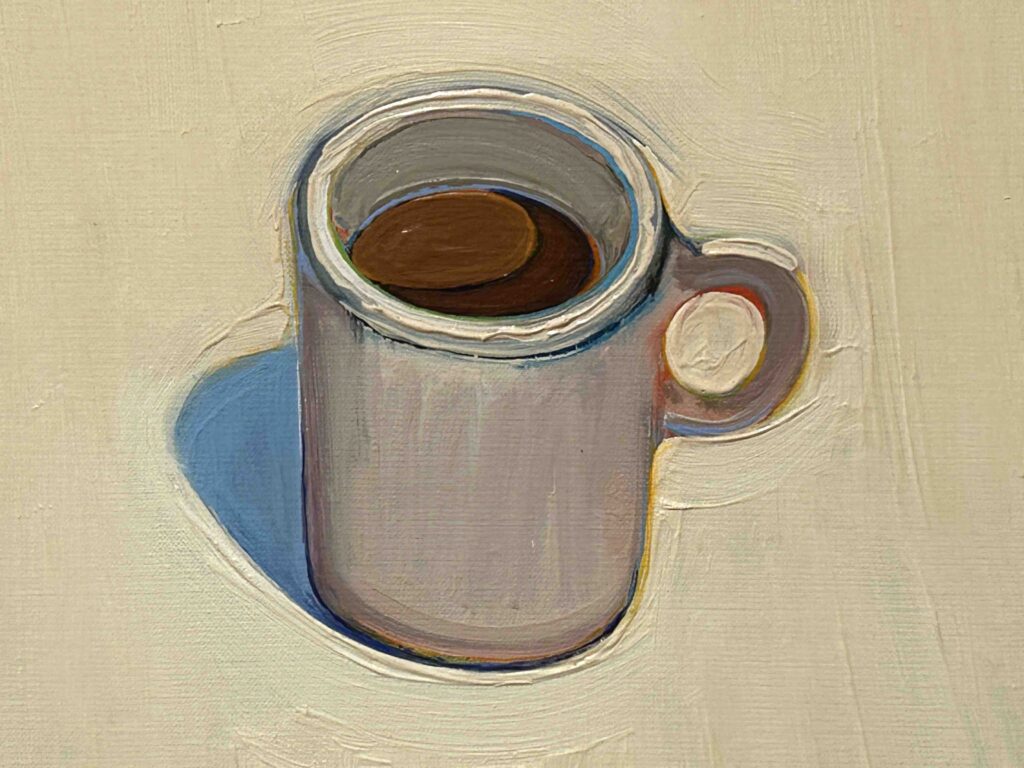The Sunday dozen

John Wyver writes: Welcome to a selection of writing on television, film, visual art, the politics of images, dance and poems that I found stimulating over the past week. The image above is a detail of Wayne Thiebaud’s painting ‘Cup of Coffee’, 1961, on view in the highly recommended exhibition Wayne Thiebaud. American Still Life at the Courtauld Gallery until 18 January. Seeing the show recently, and loving it, I felt a strikingly strong urge to steal this small, exquisite canvas.
• The BBC is under threat like never before. This is how to save it: urgent from Pat Younge in the Guardian;; Younge is Chair of British Broadcasting Challenge, which has issued an important report, Renewing the BBC: A New Charter for Britain and the World, which can be downloaded here.
• How Dennis Potter’s TV plays were guides to the purgatory of the modern age: Darran Anderson with a fine overview of the work of Dennis Potter, linked to the current exhibition, Very High Frequency by Hilary Lloyd at Studio Voltaire in Clapham.
• Penda’s Fen reinvents Mercia for the modern age: for The Dispatch, Samuel McIlhagga discovers David Rudkin and Alan Clarke’s masterwork and does a more than decent job writing about it, including talking to Ian Greaves, author of the recently published and invaluable Penda’s Fen: Scene by Scene.
• Bazin, television critic: a bit niche this, but I found it one of the most interesting pieces I read this week; the online journal Sabzian has published (in French, English and Dutch) a collection of eight texts from the 1950s written about television by the great French critic André Bazin; and at the main link here Tillo Huygelen, translated by Trevor Perri, provides an exemplary introduction.
• Blossoms Shanghai: an introduction: starting on Monday the US-based arthouse streamer Criterion Channel (so, yes, you need to subscribe and from the UK use a VPN) begins an exclusive showing of Hong Kong filmmmaker Wong Kar Wai’s mammoth, 30-episode television series, Blossoms Shangai; here, critic John Powers sets the scene.
• What even Is a ‘box office flop’ anymore?: interesting reflections on movie financing by Brian Welk for IndieWire.
• The strange afterlife of Hilma af Klint, painting’s posthumous star: although I’m not a particular fan of the paintings, I have long been fascinated by the story of the late nineteenth-century Swedish artist who over the past decade has been rediscovered as a supposed precursor of abstraction; Alce Gregory for The New Yorker [£, but limited free access] is very good on the how and the why.
• French ideas, made in the USA: for The New York Times, Emily LaBarge in Paris reviews Echo Delay Reverb: American Art, Francophone Thought, an exhibition at the Palais de Tokyo curated by Chicago-born art historian and curator Naomi Beckwith; this is now definitely on the must-see list for my pre-Xmas day trip (along with Jacques-Louis David at the Louvre and Minimal at the Bourse de Commerce).
• Pity and fear: a powerful essay by Hisham Matar for Equator about images of cruelty that begins with Titian’s paintings and moves [content warning here] to photographs from Abu Ghraib and Gaza, and to an analysis that finds resistance, dignity and hope.
• Writing history in a time of genocide: Anne Irfan for History Workshop:
it is critical to ask what the purpose of studying, researching and writing the history of Gaza really is, and whether it can be justified. Such questions are especially pertinent in the Western Anglophone academy, where knowledge production has long been shaped by epistemic violence
• ‘One being dancing’: I’ve recently finished the audiobook of Francesca Wade’s Gertrude Stein: An Afterlife (read by the author), which I enjoyed enormously, and here she is writing for The New York Review about a new work, Stein by the great eighty-five-year-old dancer and choreographer Lucinda Childs.
• Iris Murdoch’s poems were best left in the attic: this is particularly cherishable – reviewing a ‘wildly uneven’ volume of the writer’s verse for the New Statesman [£; limited free access], Terry Eagleton is whip-smart and has a great opening paragraph:
A long time ago, I ran into Iris Murdoch at a party where the host had unleashed a lethal cocktail on his guests in order to retire to his study and write his book undisturbed. Being somewhat the worse for wear, I subjected the startled author to a garbled, spectacularly ill-informed critique of her fiction. She took it in surprisingly good part…
• This is all John Roberts’ fault: exceptional reporting on the Supreme Court chief justice by Pema Levy and Ari Berman for Mother Jones.
• And finally… Joan Baez sings ‘The Ballad of Joe Hill’ at Woodstock in 1969. Just because.
Leave a Reply